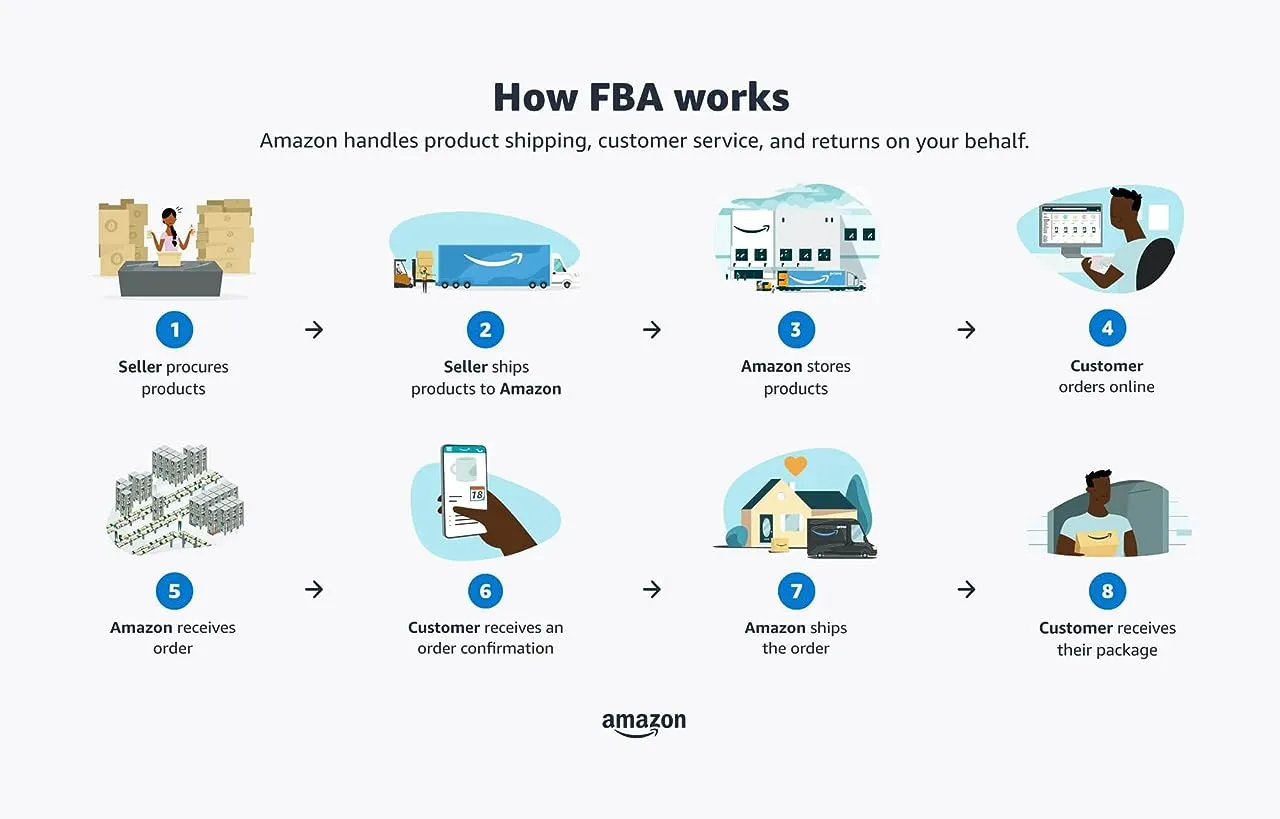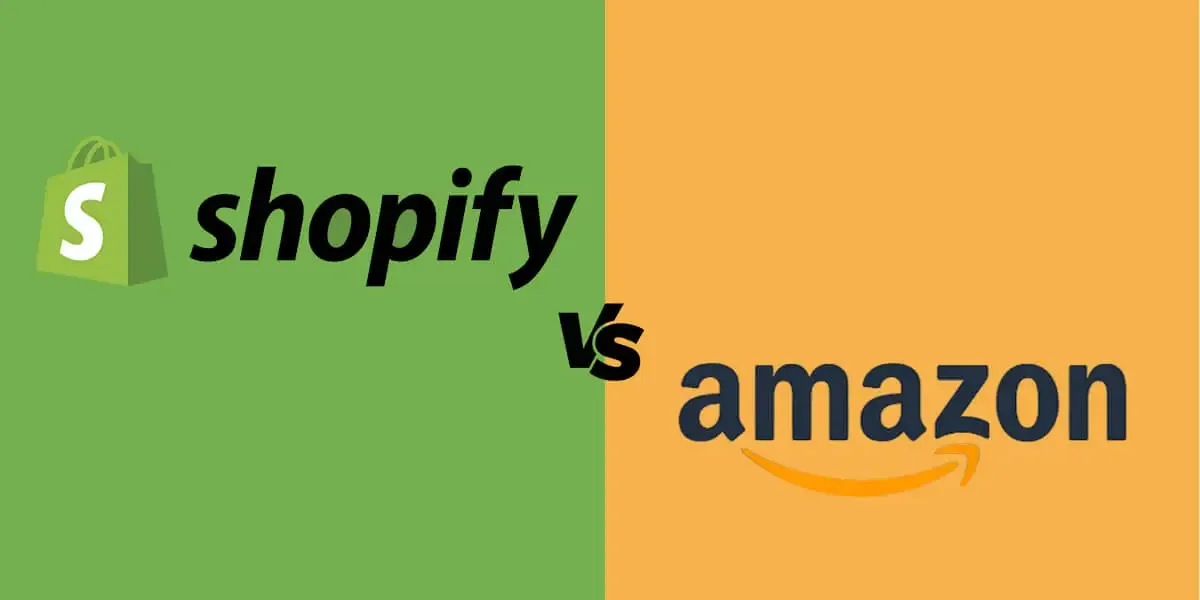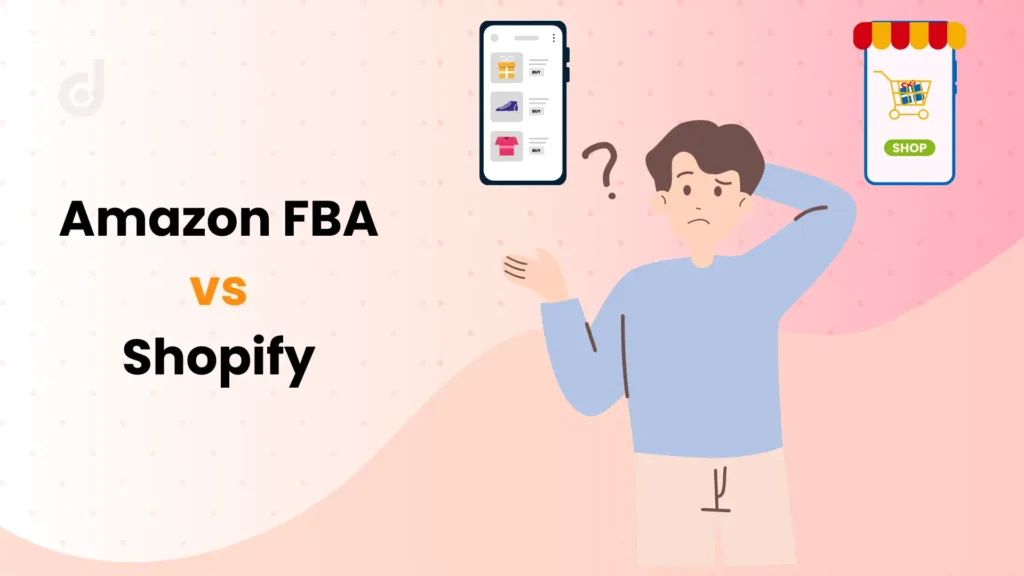So you’ve caught the e-commerce bug, your entrepreneurial spirit buzzing with ideas for the next big online store. But with two behemoths like Amazon FBA and Shopify dominating the landscape, choosing the right platform can feel like navigating a jungle gym in the dark.
Fear not, intrepid business builder! This guide will be your flashlight, shedding light on the key differences between Amazon’s fulfillment fortress and Shopify’s DIY storefront haven. We’ll delve into fees, target audiences, branding control, and more, to help you confidently plant your e-commerce flag on the path to success.
Understanding the Platforms: Amazon FBA Vs Shopify
Deciding between Amazon FBA and Shopify for your new ecommerce business can feel like choosing between a bustling marketplace and your own brick-and-mortar store. Let’s dissect the inner workings of each platform to help you make the right call.
Amazon FBA
Ever dreamed of having a bustling online store without the storage space or shipping headaches? Enter Amazon FBA, your one-stop shop for streamlined e-commerce fulfillment. Think of it as a giant warehouse in the cloud, stocked with your products and ready to rocket out to customers across the globe.

Here’s how it works:
- Listing your products: You become a merchant on Amazon, creating detailed product listings that showcase your wares to millions of potential customers browsing the marketplace. Think of it as setting up your virtual shop window on a bustling high street.
- Inventory preparation: Now, for the behind-the-scenes magic. You prepare your products according to Amazon’s specific guidelines, ensuring proper labeling, packaging, and barcodes. Think of it as getting your goods ready for a smooth journey through Amazon’s fulfillment network.
- Sending your inventory: Time to ship! You send your prepared products to designated Amazon fulfillment centers, strategically located across the country. Think of these as your hidden warehouses, ready to spring your goods into action when orders come in.
- The fulfillment dance: When a customer clicks “buy,” Amazon’s automated system springs into action. Your product is swiftly picked from the warehouse shelf, expertly packed, and whisked off on a speedy delivery journey. Think of it as a well-oiled machine ensuring your customers get their hands on their purchases in record time.
- Sit back and manage: The best part? You get to watch your sales roll in and manage your inventory levels from a convenient online dashboard. Amazon handles the rest – customer service, returns, and even refunds. Think of it as having a dedicated team working behind the scenes, keeping your customers happy and your business running smoothly.
FBA’s perks are plentiful:
- Massive reach: Access millions of potential customers already browsing Amazon, giving your products instant visibility and sales potential.
- Logistics on autopilot: Forget about packing boxes and shipping labels! Amazon takes care of everything, freeing you to focus on marketing and growing your business.
- Fast and reliable shipping: Prime members get their orders in lightning speed, thanks to Amazon’s extensive network of fulfillment centers.
- Top-notch customer service: Professional customer service from Amazon ensures higher customer satisfaction and fewer headaches for you.
- Reduced overhead costs: No need for your own warehouse or shipping staff, potentially leading to cost savings.
- Scalability: Easily adjust your inventory levels as your business grows, without worrying about outgrowing your own fulfillment capabilities.
FBA downsides:
- Fees: Be prepared for storage, fulfillment, and referral fees, which can add up for bulky or low-margin items.
- Competition: You’ll be competing with countless other sellers, demanding strong product differentiation and competitive pricing.
- Less control: You relinquish some control over branding and pricing compared to a standalone store.
- Limited product categories: Not all products are eligible for FBA, so check Amazon’s guidelines before diving in.
- Dependence on Amazon’s policies: Your business success is tied to Amazon’s rules and regulations, so staying informed is crucial.
Amazon FBA: Key Features:
- Multi-channel fulfillment: Sell on Amazon and other channels like your own website or social media, using FBA as the central fulfillment hub.
- Inventory management: Monitor stock levels, receive automatic notifications for low inventory, and easily send additional products to fulfillment centers.
- Prime shipping: Your products become eligible for Prime shipping, giving them a significant sales boost with Prime members.
- Returns and refunds: Amazon handles the entire process, saving you time and hassle.
- Customer service: Trained Amazon representatives answer customer inquiries and resolve issues, building trust and loyalty.
- Reporting and analytics: Gain valuable insights into sales performance, inventory levels, and customer behavior.
Shopify

Amazon FBA might be the pre-built condo and great alternative for shopify, but Shopify is like your own customizable dream house. It’s a powerful website builder with an e-commerce engine, giving you complete control over the look, feel, and functionality of your online storefront. Think of it as a blank canvas where you can paint your brand with every pixel and feature.
Here’s how you craft your online haven:
- Design your dream store: Choose from a library of customizable themes, tailor the layout, upload stunning visuals, and let your brand personality shine through. Shopify offers complete design freedom, unlike the standardized look of Amazon listings.
- Add products and set prices: Add detailed descriptions, high-quality images, and manage your inventory with ease. Unlike Amazon’s competitive marketplace, you control your pricing and promotions, allowing for strategic markups and special offers.
- Connect your payment gateway: Integrate with trusted payment processors to accept credit cards, online wallets, and even cryptocurrency, giving customers a seamless checkout experience.
- Market and drive traffic: Shopify offers built-in marketing tools to run email campaigns, discount codes, and social media integrations. However, unlike Amazon’s built-in audience, attracting customers requires your own marketing muscle.
- Fulfill orders, your way: While Shopify doesn’t handle fulfillment like FBA, it gives you flexibility. Choose to manage shipping yourself, integrate with third-party fulfillment services, or even offer in-store pickup if you have a brick-and-mortar location.
Shopify Advantages:
- Branding freedom: Craft a store that reflects your brand identity, voice, and values – no cookie-cutter templates here.
- Customization galore: Adapt your store’s look and feel, product pages, checkout process, and more to cater to your specific needs and customer preferences.
- Add-on power: Extend your store’s functionality with a vast library of apps and integrations for marketing, accounting, shipping, and more.
- Ownership matters: You control your customer relationships, data, and pricing, building a loyal following over time.
Shopify Cons
- Marketing hustle: You’re responsible for attracting customers to your store, requiring marketing savvy and ongoing effort.N
- Fulfillment logistics: Managing shipping and returns can be complex, especially for growing businesses.
- Technical know-how: While Shopify is user-friendly, setting up and managing your store might require some technical skills or a helping hand.
Shopify Features
- Design your dream store: While reviewing the shopify platform, we can that you can unleash your inner artist and with a vast library of customizable themes, drag-and-drop elements, and add-ons you can create a great e-commerce store. Think sleek minimalist, vibrant boho, or anything in between – your unique vision takes center stage.
- Product playground: Showcase your wares with detailed descriptions, high-quality images, and variations (think colors, sizes, flavors). Manage inventory levels, set prices and promotions, and track performance with ease. It’s your virtual product haven!
- Checkout champion: Offer secure payment options through various gateways, like credit cards, PayPal, and even alternative methods like cryptocurrency. Make the checkout process smooth and frictionless for every customer.
- Marketing maestro: Shopify doesn’t hand you a built-in audience like Amazon. But it empowers you to become a marketing whiz! Connect with potential customers through social media, search engine optimization, email campaigns, and more. Attract, engage, and convert – the power is in your hands.
- App arena: Expand your store’s functionality with a universe of apps and integrations! Boost marketing efforts with email automation tools, simplify accounting with integrations, or offer unique shipping options. The possibilities are endless!
- Data detective: Gain valuable insights into your business with comprehensive reporting and analytics. Track sales performance, analyze customer behavior, and optimize your store based on data-driven decisions. Knowledge is power, and Shopify gives you the tools to wield it!
Key Comparison Points Amazon FBA and Shopify

Now that we’ve explored the inner workings of each platform, let’s get down to brass tacks: money matters. Pricing and fees are crucial factors in deciding which platform will keep your business humming. So, here is a breakdown of the financial landscapes:
A. Pricing and Fees
Think of fees like tolls on your e-commerce journey. Both platforms take a slice of your sales, but how they charge matters:
Amazon FBA:
It’s a subscription-based model with monthly fees and per-item storage and fulfillment charges. These vary depending on product size, weight, and storage duration. Fees range from 8-15% per sale, depending on the product category. Think of it like renting space in a bustling marketplace and paying for each package shipped out.
Shopify:
You choose a monthly plan based on store features, with transaction fees on top. Monthly subscriptions start at $29, with increasing features and price points for larger businesses. Also, Shopify charges 2% per transaction, while higher tiers have lower rates or flat monthly fees.
No storage charges, but you’ll need to factor in fulfillment costs if you handle it yourself or integrate with a third-party service. Think of it like owning your own store – rent is fixed, but product delivery becomes your responsibility.
Which is cost-effective? It depends. For:
- High-volume, small-and-light products: FBA can be surprisingly affordable due to its efficient fulfillment network. Think phone cases or jewelry.
- Low-volume, bulky products: Shopify might be cheaper, as you avoid FBA’s storage fees. Think furniture or exercise equipment.
- Starting businesses: Shopify’s simpler pricing model might be easier to manage initially.
B. Product Control and Branding
Your brand is your story, and both platforms let you tell it, but with different levels of control:
Amazon FBA:
Listings follow Amazon’s format, limiting customization. Branding happens mostly through product descriptions and packaging. Imagine fitting your story into a pre-built bookshelf – limited space, but Amazon’s built-in audience is readily available.
Shopify:
You paint your whole shop with your brand colors. Design bespoke product pages, implement unique shopping experiences, and build customer relationships directly. Think of crafting your own storybook – complete creative freedom, but you need to attract readers.
Which is better for brands?:
- Established brands: Shopify lets you showcase your unique identity and cultivate loyal customers.
- New brands: FBA’s massive audience helps gain initial traction, but building brand recognition takes more effort.
C. Marketing and Customer Acquisition
Driving customers to your virtual doorstep is crucial, and each platform approaches it differently:
Amazon FBA:
You benefit from Amazon’s built-in traffic, but stand out requires strong product listings and competitive pricing. Imagine being listed in a bustling directory – visibility is high, but competition is fierce.
Shopify:
You’re responsible for attracting customers through SEO, social media, email marketing, and other strategies. Imagine owning a charming store on a quiet street – you need to make some noise to get foot traffic.
Who benefits from each approach?
- Brands with existing followings: Leverage Shopify’s marketing tools to engage your audience directly.
- Brands targeting specific niches: Use FBA’s audience data to find and reach your ideal customers within the marketplace.
D. Logistics and Fulfillment

Now that we’ve covered the financial and brand-related aspects, let’s dive into the nitty-gritty of getting your products from A (your inventory) to B (your customers’ doorsteps). Each platform handles logistics differently, so let’s unpack their strengths and weaknesses:
Amazon FBA: Imagine a team of dedicated elves whisking your products away to strategically located fulfillment centers. That’s FBA in a nutshell.
- Pros:
Amazon handles everything from storage and picking to packing and shipping, ensuring fast and reliable delivery through their Prime network. You simply send your inventory and watch the orders roll in.
- Cons:
You lose some control over the fulfillment process and packaging, and FBA fees can add up, especially for bulky or low-value items. Think of it as convenience at a cost.
Shopify: Here’s where your inner packing Picasso shines. You’re in charge of the whole show, from storing your inventory to shipping it out.
- Pros:
You have complete control over packaging, branding, and shipping options, allowing you to personalize the customer experience. Plus, you can choose your own fulfillment provider or even handle it yourself. Think of it as having your own warehouse and delivery truck, offering flexibility but requiring more effort.
- Cons:
You need to manage storage space, packaging materials, and shipping logistics, which can be time-consuming and require additional investment. Think of it as DIY fulfillment, with the rewards and responsibilities that come with it.
Choosing the right approach depends on your:
- Business size: If you’re starting small, FBA’s convenience can be a boon. As you grow, Shopify’s flexibility might become more attractive.
- Product type: For bulky or low-value items, Shopify might be more cost-effective. For smaller, high-volume products, FBA can shine.
- Fulfillment expertise: If you’re comfortable handling logistics, Shopify gives you more control. If you prefer a hands-off approach, FBA is the way to go.
E. Scalability and Growth Potential
As your business flourishes, you need a platform that can keep up. Let’s see how each platform handles growth:
Amazon FBA: Think of it as a rocket ship – you can quickly reach a vast audience and scale your sales through Amazon’s established infrastructure. However, you’re relying on their platform and rules, which can limit your brand differentiation and long-term growth.
Shopify: Think of it as building your own spaceship – you have complete control over the design, destination, and fuel (marketing) but need to navigate the journey yourself. While it may take longer to reach the same level of sales, you build a unique brand and customer base that’s yours to own and expand.
Which platform fosters sustainable growth?
- For rapid expansion: FBA’s existing audience and fulfillment network can propel your brand quickly.
- For long-term brand building: Shopify empowers you to cultivate loyal customers and control your growth trajectory, laying the foundation for sustainable success.
Remember, the ideal platform is the one that best aligns with your business goals and resources. Whether you choose the convenience of FBA or the flexibility of Shopify, the key is to focus on building a strong brand and delivering exceptional customer experiences.
Who Should Choose Amazon FBA?
Amazon FBA shines for businesses seeking a fast-paced launch and leveraging its massive built-in audience. Think of it as a pre-built rocket ship ready to blast off, perfect for:
- High-volume, small-and-light products: Phone cases, jewelry, or accessories benefit from FBA’s efficient fulfillment network and Prime delivery.
- Brands with limited resources: FBA handles logistics, freeing you to focus on product development and marketing.
- Testing new product lines: Quickly gauge customer interest and gather valuable data without investing in your own fulfillment infrastructure.
Here are some successful FBA businesses and their strategies:
- Thrive Market: This health-conscious online grocer uses FBA’s reach and fulfillment capabilities to deliver fresh, organic products nationwide.
- Beardbrand: This men’s grooming brand leverages FBA’s subscription fulfillment options to build recurring revenue and customer loyalty.
- Mpow: This electronics company utilizes FBA’s global fulfillment network to expand its reach and compete with larger brands.
However, remember:
- Competition is fierce: Standing out on Amazon requires strong product listings, competitive pricing, and effective marketing.
- Brand control is limited: You adapt to Amazon’s platform, not the other way around.
- FBA fees can add up: Carefully calculate costs to ensure profitability, especially for bulky or low-value items.
Now, let’s explore the other side of the e-commerce coin…
Who Should Choose Shopify?
Shopify empowers businesses to build their own unique online storefronts and cultivate loyal customer bases. Think of it as a customizable spaceship you can design, develop, and navigate yourself, ideal for:
- Established brands with existing followings: Leverage Shopify’s marketing tools and integrations to directly engage your audience.
- Businesses with unique brand identities: Create a bespoke online store that reflects your brand values and resonates with your target customers.
- Those seeking long-term brand building: Shopify fosters direct customer relationships and data ownership, laying the foundation for sustainable growth.
Here are some successful Shopify businesses and their strategies:
- Allbirds: This eco-friendly footwear brand Allbirds uses Shopify’s flexibility to create a personalized shopping experience and build a strong community around its sustainable values.
- Kylie Cosmetics: This celebrity-backed makeup brand by Kylie Jenner leverages Shopify’s customization options and social media integrations to drive sales and build brand awareness.
- MVMT Watches: This minimalist watch brand, MVMT utilizes Shopify’s powerful analytics and data insights to optimize its marketing campaigns and reach a global audience.
But keep in mind:
- Marketing is your responsibility: Driving traffic to your store requires ongoing effort and investment in SEO, social media, and other marketing strategies.
- Fulfillment needs management: You’ll need to handle packaging and shipping yourself or find a third-party fulfillment provider.
- Technical know-how helps: Maintaining and updating your store might require some technical expertise or reliance on developers.
Remember: Shopify rewards those who invest in building a unique brand and cultivating customer relationships.
There’s no one-size-fits-all answer. Weighing your priorities, resources, and long-term goals against the strengths and weaknesses of each platform will help you discover your e-commerce champion. And guess what? Digimonk Solutions, your friendly neighborhood Shopify experts, can help you build and launch your dream store on this powerful platform!
Which One is Right For You?
It all boils down to explosive reach and hands-off fulfillment versus brand control and customized growth.
So, which is right for you? Ask yourself:
- Do I prioritize speed and reach? Choose FBA for a quick launch and leverage Amazon’s audience power.
- Do I value brand identity and customer connections? Shopify empowers you to build a unique online space and nurture your own community.
- Am I comfortable with hands-off logistics? FBA takes care of everything, while Shopify requires managing fulfillment yourself.
- Do I have the resources for marketing and technical know-how? Shopify demands more effort in these areas.
Remember, there’s no perfect answer. Choose the platform that aligns with your business goals, resources, and long-term vision. And if you’re drawn to the world of customized storefronts and brand-building, Digimonk Solutions, your Shopify specialists, are here to guide you every step of the way.


